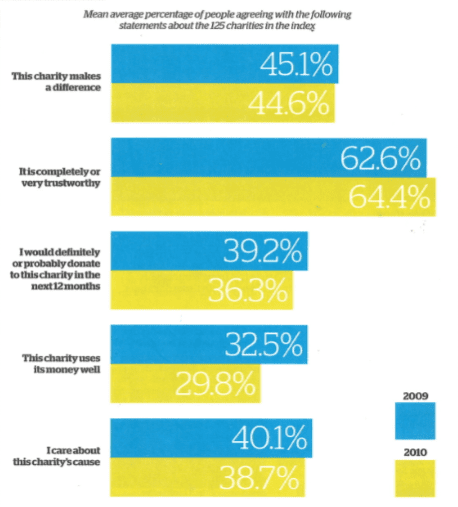What's the point of branding?
So you've got a brand. You've brainstormed with stakeholders, you've paid many thousands of pounds for a sparkling new logo, a corporate identity and a list of adjectives that are going to help you change the world.
And what's the result?
Has it increased response rates to your mailing packs? Has it helped reduce attrition? Has it increased donor loyalty?
If it hasn't, maybe something is going wrong.
In the commercial world, a brand adds value to a product or service. In short, it increases income.
For charities, things aren't so clear cut. I've seen 'brand expenditure' justified in terms of increasing awareness or extending knowledge of organisational goals.
All well and good. But if that doesn't translate to more supporters giving and doing more, I'm not sure that a new brand can be classified as a success.
That's why I was rather concerned to see the some of the findings from the 2010 Charity Brand Index survey (you can see my thoughts on the 2009 survey here).
A total of 3,203 adults took part in the survey, answering questions regarding recognition, individual giving, publicity work, trust and support.
When the answers had been cross-tabulated and added up, each charity was left with a score and this year, Cancer Research UK came out on top, followed by BBC Children in Need, RSPCA, Macmillan Cancer Support and Great Ormond Street Hospital Children's Charity. SSAFA Forces Help saw the biggest rise and NDCS had the biggest fall.
You can see the full index here.
But what's most interesting are the findings about general attitudes to charities. And for me, one result stands out above all the rest – they found that less than 30% of people thought that charities were using money well, down from 32.5% in 2009.
It's left me scratching my head. Donors are continuing to lose touch with the charities they support. Trust might be up, but what about engagement? it seems to be in decline.
We know that one of the most powerful ways to engage a donor is to show them how you have used a gift. It's something donors welcome. When you ask them what they want from a charity, it's pretty much top of the list.
And if we are trying to add value to a charity brand that will translate into more funds, surely this research is showing us that we are doing something wrong. Any study of attrition rates would tend to confirm this view.
Donors have ultimate power. If they don't like the way they are treated after giving once, it is highly likley that their next gift will go elsewhere.
Perhaps they might think that by ignoring their role, we are being a little ungrateful and maybe even a little arrogant. It's happened to organisations like GAP, Coca Cola and Tropicana. There's no reason why it couldn't happen to us to.
So rather than producing advertising that says how great our charity is, perhaps we could learn from what fundraisers were doing before many of us were actually born and produce ads like this from January 1964 that thank donors for their role in raising £1,000,000.
It shows donors just how important they are - in no uncertain terms...
"So people live who would have died. And children have a chance... because you sent a cheque".
If I'd given to the appeal, that ad would have certainly made me feel good. Maybe I'd have given again. And perhaps that's what charity branding should actually be about.
Tags In
Related Posts
2 Comments
Comments are closed.
The Essentials

Crack the Code to Regular Giving: Insights, Strategies, and a Special Giveaway!

‘Tis Halloween. Keep to the light and beware the Four Fundraisers of the Apocalypse!

Why do people give? The Donor Participation Project with Louis Diez.

A guide to fundraising on the back of a postcard

What does the latest research tell us about the state of fundraising?








Hi Mark:
Quick question… are these charities doing well in terms of revenue?
I ask because I actually think that most people will say that charities aren’t using the money well and not really mean it. I think it’s a loaded question basically.
If 64% think they’re trustworthy and 45% think they make a difference – how do these people define using the money well? They may be in a fluster about salaries or other nonsense that is irrelevant.
I find many of these survey’s to be flawed and influenced by things that may not fully represent the true thoughts of the individuals who respond.
Personally – I think the word “Charity” needs to be rebranded, because I believe most people perceive the word “charity” as negative and automatically associate it with waste and other negative stereotypes, which results in these types of responses which may or may not accurately reflect their true thoughts about a given organization or cause.
Hi Laurie
The organisations mentioned raise huge sums. But could they do better? I think so.
BBC Children in Need is the UK’s annual telethon. It’s on one night a year, but they concentrate on showing donors how their gifts have made a difference. The result is they make it to number two on the Charity Brand Index List – and they aren’t a stand alone charity – they are very, very closely associated with the BBC.
The other charities are regularly on TV, online, in the papers, in direct mail and still we see poor levels of engagement.
When it comes to how charities use money, I think the key issue is perception – donors don’t normally know how their money is being used. That’s why donors can’t say that charities use their money well.
Any quantitive research has to be read in tandem with qualitative studies and we pretty much see the same thing coming out of our depth interviews and groups.
People trust charitable organisations and think they make a difference. But this doesn’t translate to making best use of funds. A UK study run over three years shows people think 40% admin expenditure and 35% fundraising expenditure is pretty normal…
https://queerideas.co.uk/my_weblog/2010/04/how-i-learned-to-stop-worrying-and-love-financial-overheads.html
Fundamentally, people have pretty low expectations of charities (which many fail to live up to). I’m not sure whether a new name for charity is necessarily the answer. Though it could well help.
I think charities need to stop focusing on themselves and really consider what donors need. Most charities do great work on a very tight budget. To my mind the main problem is a ‘comms programme’ that is designed to say how great the charity is without showing the donor the evidence that counts – how the donor’s money has been used.
Thanks for reading and commenting.
Mark